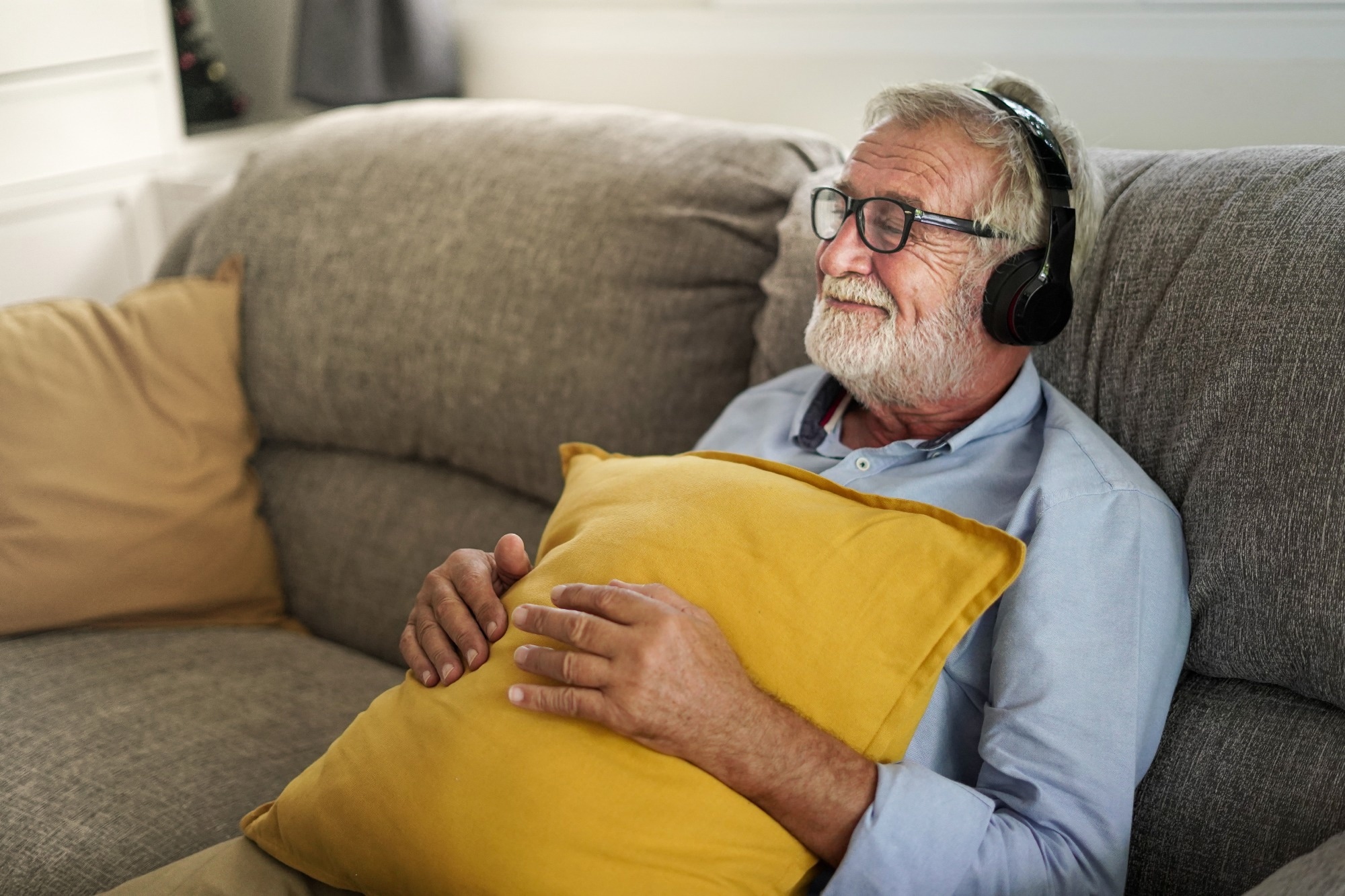Music, light, and digital therapies show promise as safer alternatives to risky medications in easing dementia-related agitation, offering a potential path for some patients and caregivers alike.

Story: Treatment of agitation in dementia - a systematic review. Image credit: RasaSopittakamol/Shutterstock.com
Millions of people suffer from dementia conditions like Alzheimer’s disease. The occurrence of anxiety and distress often complicates their care. A systematic review published in the International Journal of Emergency Medicine assessed the efficacy and safety of current drug and non-drug interventions for agitated patients with dementia.
Introduction
Dementia, including Alzheimer’s disease, affects over 55 million people worldwide, with nearly 10 million new cases each year. Patients with dementia may shout, complain, pace about, or become violent. These verbal and physical outbursts make the job of a caregiver more complicated.
In addition to causing stress, agitated dementia patients are more likely to have greater healthcare needs, resulting in some needing to be committed to full-time care in health facilities. Managing agitation would greatly benefit patients and their caregivers.
Historically, dementia patients were treated mainly by physical restraint, often within institutions. Later, interventions such as hydrotherapy and sedatives were introduced, though these were often ineffective.
Psychotropic medications have been used to manage agitation. However, they produce deep sedation and increase the risk of illness and sometimes death.
As scientists began to understand more about the cognitive aspects of dementia, behavioral therapies, cognitive stimulation, and environmental stimuli were used in treatment. Cholinesterase inhibitors can also be used to reduce cognitive symptoms.
This systematic review analyzed nine clinical studies: three focused on pharmacological interventions (brexpiprazole, mirtazapine, and an escitalopram trial with no outcome data), and six on non-pharmacological therapies such as music therapy, light therapy, digital care programs, and high-frequency repetitive transcranial magnetic stimulation (rTMS) combined with cognitive training.
Findings indicate that brexpiprazole demonstrated dose-dependent improvements in agitation, while mirtazapine showed no significant benefit and was associated with increased mortality. One medication study (on escitalopram) was included as context but did not provide results.
Study findings
The review included nine clinical studies, three focusing on medications and the others on non-medication therapies. The results suggest that brexpiprazole improves agitation but not mirtazapine, which increases the mortality risk. One of the three medication studies was a study design without outcome data and was therefore included for contextual relevance, but it did not contribute any results.
“These findings reflect a broader challenge in dementia research: the limited efficacy of medications that primarily address symptoms rather than underlying disease mechanisms.”
At present, most dementia patients with agitation are treated using antipsychotics, antidepressants, and other psychiatric medications. However, antipsychotics can increase the risk of cardiovascular events and death, highlighting the need for safer and more effective alternatives.
Non-drug options include light-based, music, and digital care programs. These stimulate various physical senses that could lead to improved mood. The social interaction required for these therapies also promotes better behavior.
Among non-drug therapies, music reduced agitation in almost all areas. Audiobooks had some calming effects in certain areas but were associated with increased agitation over time in others, particularly in the subscale of non-staff-directed physical agitation. This suggests that both the type and duration of auditory intervention are important to consider.
Personalized music interventions were shown to reduce verbally agitated behaviors and increase pleasure, without increasing physical agitation or negative emotions. The use of repetitive transcranial magnetic stimulation (rTMS) combined with cognitive behavioral therapy reduced all neuropsychiatric symptoms, including agitation, within just four weeks.
Personalized light therapy has been shown to improve behavior, sleep, and mood in patients with dementia. This agrees with earlier research on misaligned biological clocks in dementia patients, emphasizing the role of environmental changes in reducing neuropsychiatric symptoms.
Such treatment programs require the caregiver to be involved and are often costly, limiting their accessibility. Variability in treatment response, influenced by genetic, lifestyle, and environmental factors, highlights the need for personalized approaches.
Digital care programs such as the Wellbeing and Health for People Living with Dementia (iWHELD) program were also helpful during the recent coronavirus disease 2019 (COVID-19) pandemic. This free initiative aims to support and assist care home staff in caring for such patients by ensuring they receive human interaction and personalized care. The iWHELD program decreased the use of psychotropic medications without worsening agitation.
Diagnosis remains a challenge, with many patients identified only at advanced stages when treatment is less effective. Current diagnostic tools can be invasive and costly, further delaying intervention.
Future directions
Currently, drugs to eliminate dementia-associated beta-amyloid plaques and tau tangles are being developed to prevent dementia itself. Gene therapy is another potentially practical approach, targeting dementia-associated mutations.
Virtual reality (VR) and brain-computer interfaces (BCI) are other fields of research using advanced technologies to improve cognitive skills and facilitate greater social engagement.
Conclusions
While some medications are often effective, they may pose greater safety risks than non-drug approaches, which offer significant efficacy benefits and improve the quality of life. Optimal management may require combining pharmacological and non-pharmacological strategies, tailored to individual needs.
This study highlights the importance of personalized care for individuals with dementia. Individual patient preferences can alter the patients' treatment efficiency and quality of life.
While research is ongoing into drug and non-drug therapeutic options, this review underscores the value of integrated and holistic care combining both approaches. Preventative strategies, including early detection and lifestyle modifications, also hold promise but require further investigation.
Download your PDF copy now!